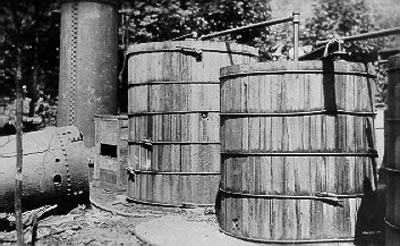The History of Moonshine
There has to be a good reason
to go to all the trouble of making moonshine. Actually, there
have been several reasons, but they all boil down to one
thing: government control of the alcohol trade.
Moonshining began very early in American history. Shortly
after the Revolution,
the United States found itself struggling to pay for the
expense of fighting a long war. The solution was to place a
federal tax on liquors and spirits. The American
people, who had just fought a war to get out from under
oppressive British taxes (among other purposes), were not
particularly pleased. So they decided to just keep on making
their own whisky, completely ignoring the federal tax.

Photo courtesy
National
Parks Service
The Blue
Blazes whiskey still at Catoctin Mountain, Maryland, was
a large commercial operation. More than 25,000 gallons
of mash were found in 13 2,000-gallon vats when the
operation was raided in July
1929. |
For these early moonshiners, making and selling alcohol
wasn't a hobby or a way to make extra cash -- it was how they
survived. Farmers could survive a bad year by turning their
corn into profitable whisky, and the extra income made a harsh
frontier existence almost bearable. To them, paying the tax
meant they wouldn't be able to feed their families. Federal
agents (called "Revenuers") were attacked when they
came around to collect the tax, and several were tarred and
feathered.
All this resentment finally exploded in 1794, when
several hundred angry citizens took over the city
Pittsburgh, Pennsylvania. President George
Washington called for a gathering of militiamen under
federal authority. Thirteen-thousand troops dispersed the mob
and captured its leaders. This Whisky Rebellion was the
first major test of federal authority for the young
government.
Despite the failure of the rebellion, moonshining continued
throughout the United States, especially in Kentucky,
Virginia, the Carolinas and other southern states. Excise
taxes on alcohol didn't go away, so moonshiners always had
incentive to avoid the law. Gun fights between moonshiners and
revenuers became the stuff of legend.
These battles escalated in the 1860s as the
government tried to collect on the excise tax to fund the
Civil War. Moonshiners and Ku Klux Klansmen joined
forces, and many pitched battles were fought. The tactics of
the moonshiners grew more desperate and brutal, intimidating
locals who might give away the locations of stills and
attacking IRS officials and their families. The tide of public
sentiment began to turn against the moonshiners. The
temperance movement, which sought to ban alcohol,
gathered steam as the United States headed into the 20th
century.
In the early 1900s, states began passing laws that banned
alcohol sales and consumption. In 1920, nationwide
Prohibition went into effect. It was the greatest thing
the moonshiners could have asked for.
Suddenly, there was no legal alcohol available. The
demand for moonshine shot up like a rocket. Moonshiners
couldn't keep up with the demand, which led to cheaper,
sugar-based moonshine, as well as watered-down moonshine. The
distillers would do anything to increase their profit.
Organized crime blossomed as speakeasies opened
in every city -- these secret saloons had hidden doors,
passwords and escape routes in case the "Feds" ever showed up
to conduct a raid.
When Prohibition was repealed in 1933, the market
for moonshine grew thin. Although moonshine continued to be a
problem for federal authorities into the 1960s and '70s,
today, very few illegal alcohol cases are heard in the courts.
Large commercial distilleries can buy raw materials on such a
large scale that, even with the taxes they must pay, their
products aren't too much more expensive than moonshine. While
some counties in the south and midwest United States remained
"dry" (alcohol-free) for decades after the end of national
Prohibition, even those localized liquor bans have, for the
most part, faded away. That leaves consumers of alcohol little
reason to seek out moonshine other than the temptation of
buying and drinking something that's "forbidden" and the
flouting of government authority. The desire to flout
government authority is one of the reasons moonshining exists
in the first place.
Here are some interesting links:
